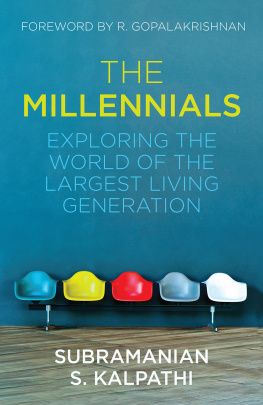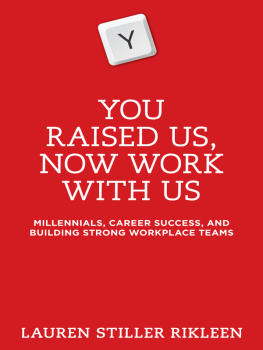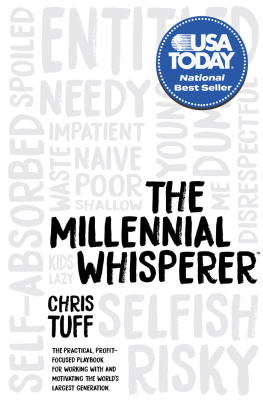Published by Motivational Press, Inc.
1777 Aurora Road
Melbourne, Florida, 32935
www.MotivationalPress.com
Copyright 2018 by Justin Sachs
All Rights Reserved
No part of this book may be reproduced or transmitted in any form by any means: graphic, electronic, or mechanical, including photocopying, recording, taping or by any information storage or retrieval system without permission, in writing, from the authors, except for the inclusion of brief quotations in a review, article, book, or academic paper. The authors and publisher of this book and the associated materials have used their best efforts in preparing this material. The authors and publisher make no representations or warranties with respect to accuracy, applicability, fitness or completeness of the contents of this material. They disclaim any warranties expressed or implied, merchantability, or fitness for any particular purpose. The authors and publisher shall in no event be held liable for any loss or other damages, including but not limited to special, incidental, consequential, or other damages. If you have any questions or concerns, the advice of a competent professional should be sought.
Manufactured in the United States of America.
ISBN: 978-1-62865-526-1
Chapter 1
The Us Vs. Them Mentality
A ll hipsters are millennials, but not all millennials are hipsters. This could be the key to our management and organizational development issues. Once you accept no rational statement can start with all millennials, we can measure their importance.
This work takes no interest in flannel, facial hair, or mens hair buns. The focus remains on strategies to optimize the apparent and potential, uniquely and patently valuable contributions shaping this contemporary generation.
It is not our job to justify millennials or their character. Enough has been said, often with contempt, about their vision and values. And, these critics often confuse millennial issues with matters of style and taste.
Those who think they are too much with us prolong the us vs. them damage to organizations. Some conflict between generations will always be with us. But, it may be time to run some intervention here.
The Why
Millennials hold the future of work in their hands. Their sheer numbers will control the future. They have the advantage of mortality. They are telling us in a million direct and indirect ways just what is going to happen in economics, government, diplomacy, education, and work.
By 2020, millennials will form 50% of the global workforce. Still, in a global economy, their talent remains in high demand. As older generations move on and out of the workplace, millennials will support them. They will be positioned to demand and design work.
Hiring millennials and keeping them happy will be critical to a companys future. Millennials bring energy, tech savvy and new ideas to companies that live and die on the threshold of innovation.
And, this central question tells us a lot. Why? could be the irksome repetitive query that characterizes the 3-year-old. But, Why? is also the genuine driving voice of curiosity and solution focus. It assumes all questions have discoverable answers.
The Pew Research Center reports, 61% of them believe there is something unique about their class. They consider themselves confident, self-expressive, liberal, upbeat and open to change.
Organizational leaders must ask how important these characteristics can be to their purposes. The most educated generation, the most culturally diverse, the most indebted, the most gender and racially mixed, the most adept at fine motor skill, the most inclined to collaborate, such characteristics are valuable to both new born and aging institutions.
Our interest, then, lies not in how we deal with them or what they need to learn from us. Rather, our interest is more passion than curiosity, a passion to learn as much as we can from their interests, goals, and practices.
This interest foregoes nothing. Their managers and organization superiors have much to teach and rights to demand. But, we would do better to forge commonalities in policy, purpose, and practice. We want to understand desirable, purposeful, and possible synergies, mutualities, and osmosis. And, we must develop strategies to optimize their contribution.
Rebuilding Fundamental Trust
As Pew points out, They embrace multiple modes of self-expression. But, beyond the tattoos, selfies, and social network blather, you will find a yearning for involvement. Raised by single parents in an age of terrorism and polarization, they wary of trusting classic institutionschurch, state, education, and business.
To the extent that you can value their self-disclosure, they want what you want: Being a good parent and homeowner positioned to help others. Perhaps surprisingly, they value living a religious life and respect their elders.
There is no evidence that they are anti-business. In fact, Deloittes research shows 76 percent now regarding business as a force for positive social impact. They remain convinced that they can exert positive social change through their work and organizations and often value the employer on that basis alone.
Millennials understand they cannot do it alone. Their perception of group think and group work reflects their ownership of technology. They understand process and shared work. Everything they know and have achieved comes from exchange and transaction. Everything they know tells them every problem has a fix, a coding solution.
They assume everything is or can be integrated, that economy, environment, geopolitics, and business exist simultaneously and concentrically. So, while local may be better for trendy restaurants, nothing organizational is local anymore.
Their twist on respect
We reap what we sow. Before you write off millennials for wanting instant satisfaction or trophies for showing up, you should remember who taught and trained them.
They learned a lot on the soccer field in years when fair meant same. And, video gaming rewarded them with stars, bells, and whistles several times a minute. They ate up the respect. The best parenting also showed them the value of demonstrated self-confidence, speaking up for themselves, looking people in the eye, and asserting their take on things. Scouts, choirs, Sunday school, kindergarten, and other organizations involved in their rearing reorganized to enable and facilitate their voices. Older generations devalued hierarchy and then, faulted them for not respecting authority.
The fact is millennials respect their elders, but they also expect treatment as equals. The generations that manage them seem to have a problem with that. It boils down to listening seriously to the other persons perspective, avoiding high-handed treatment that underscores the recipients inferior/dependent position, making decisions based on consensus rather than arbitrary opinions, and believing that the other person has valuable contributions to make.
Life as digital natives
Millennials have been born into a digital age. They have aged with it. So much a part of it, they have no other context.
All things digital form their reality. The youngest of them even have difficulty explaining things analog. Their worldview is so intricately involved with things digital that it appears to be a virtual reality to their elders.
They have an engineers mentality. They see things in code and binary sequence. And, as engineers, they avoid metaphor, irony, or subtlety. Their thinking is lateral, horizontal, and logical. And, this supports their confidence in decision making.
The same mindset sometimes ignores the dynamic of human relationships and the organic nature of organization. They are alien in a way, so they are often dismissed as different and disruptive.
Next page





![Karsh Brad - Manager 3.0 A Millennials Guide to Rewriting the Rules of Management [[Elektronische Ressource]]](/uploads/posts/book/99578/thumbs/karsh-brad-manager-3-0-a-millennial-s-guide-to.jpg)